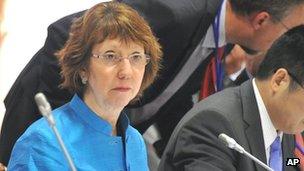Iran nuclear talks in Moscow end 'without breakthrough'
- Published

Catherine Ashton said major differences remain after two days of talks
The latest round of talks on Iran's nuclear programme has ended with no clear breakthrough, officials say.
EU foreign policy chief Catherine Ashton said "significant gaps" remained after "tough and frank" exchanges in the talks, in Russia's capital Moscow.
Chief Iranian negotiator Saeed Jalili described the two days of negotiations as "serious", but reiterated enriching uranium was Iran's inalienable right.
Iran denies Western claims it is seeking to develop nuclear weapons.
The talks between Iran and the so-called P5+1 - the US, China, Russia, France, the UK and Germany - follow other recent inconclusive rounds in Istanbul and Baghdad.
Ms Ashton said the sides had agreed to continue talks on a technical level before deciding on whether to hold further high-level talks.
Mr Jalili agreed this expert-level meeting needed to be held.
"The expert meeting could provide clear ideas for the talks," he said. "Today they [the world powers] are facing a great test in order to obtain the confidence of the Iranian people," he told reporters.
The P5+1 are demanding that Iran suspend enrichment of uranium to 20%, close down an underground enrichment facility near the city of Qom and export its stockpile of 20%-enriched uranium - measures described by one Western diplomat as "stop, shut and ship".
In return, the world powers say they are prepared to start by offering help with nuclear safety measures.
But Iran wants the West to lift sanctions, including an EU oil embargo and US measures against Iran's central bank.
It says its "non-negotiable" right to enrich uranium must be recognised. It has denounced UN Security Council resolutions against it as illegal.